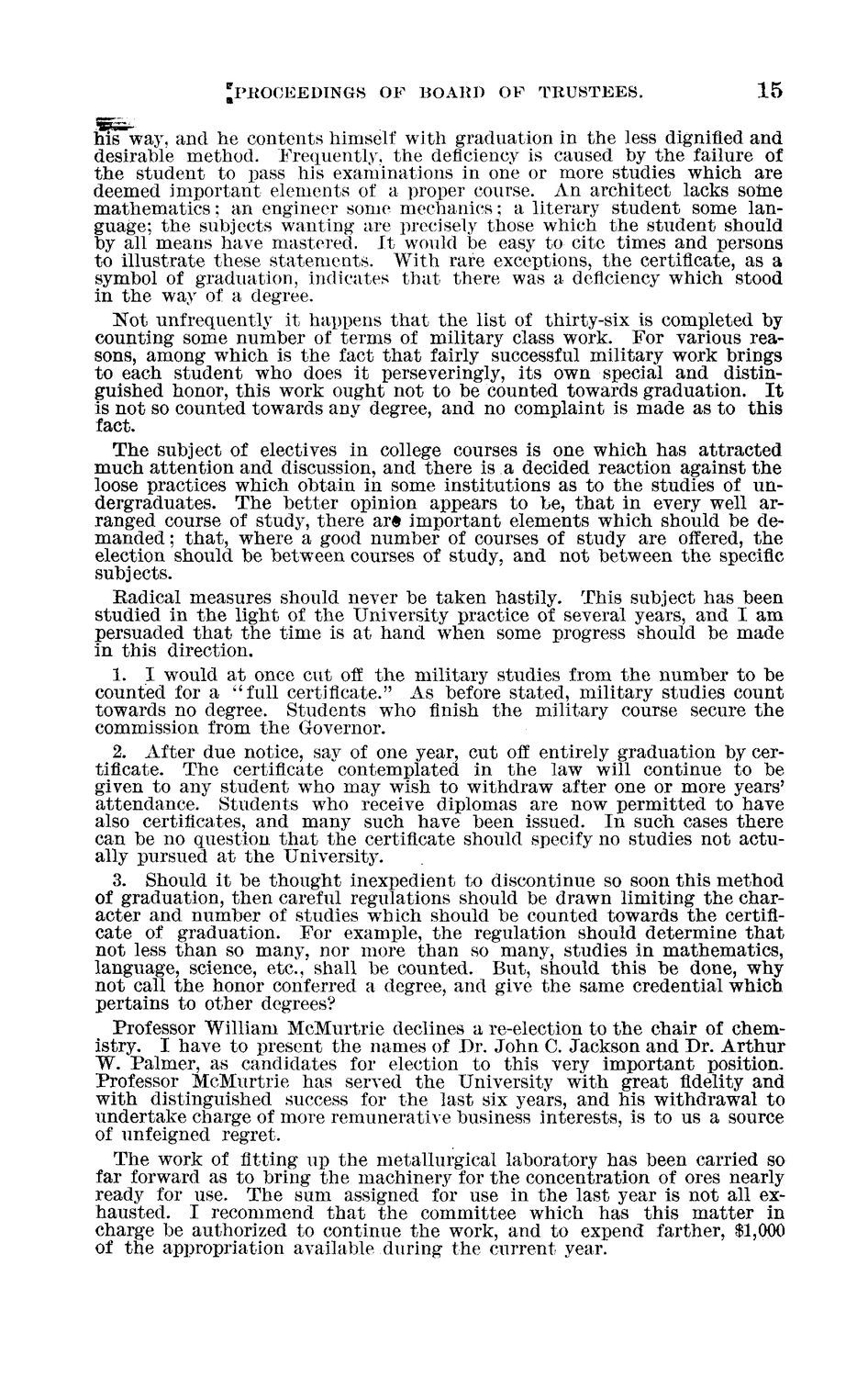| |
| |
Caption: Board of Trustees Minutes - 1890
This is a reduced-resolution page image for fast online browsing.

EXTRACTED TEXT FROM PAGE:
^PROCEEDINGS O F BOARD O F TRUSTEES. 15 his way, and he contents himself with gradviation in the less dignified and desirable method. Frequently, the deficiency is caused by the failure of the student to pass his examinations in one or more studies which are deemed important elements of a proper course. An architect lacks some mathematics; an engineer some mechanics; a literary student some language; the subjects wanting are precisely those which the student should by all means have mastered. I t would be easy to cite times and persons to illustrate these statements. With rare exceptions, the certificate, as a symbol of graduation, indicates t h a t there was a deficiency which stood in the way of a degree. Not unfrequently it happens t h a t the list of thirty-six is completed by counting some number of terms of military class work. For various reasons, among which is the fact t h a t fairly successful military work brings to each student who does it perseveringly, its own special and distinguished honor, this work ought not to be counted towards graduation. I t is not so counted towards any degree, and no complaint is made as to this fact. The subject of electives in college courses is one which has attracted much attention and discussion, and there is a decided reaction against the loose practices which obtain in some institutions as to the studies of undergraduates. The better opinion appears to be, t h a t in every well arranged course of study, there a r t important elements which should be demanded; that, where a good number of courses of study are offered, the election should be between courses of study, and not between the specific subjects. Eadical measures should never be taken hastily. This subject has been studied in the light of the University practice of several years, and I am persuaded t h a t the time is at hand when some progress should be made in this direction. 1. I would a t once cut off the military studies from the number to be counted for a "full certificate." As before stated, military studies count towards no degree. Students who finish the military course secure the commission from the Governor. 2. After due notice, say of one year, cut off entirely graduation by certificate. The certificate contemplated in the law will continue to be given to any student who may wish to withdraw after one or more years' attendance. Students who receive diplomas are now permitted to have also certificates, and many such have been issued. In such cases there can be no question t h a t the certificate should specify no studies not actually pursued at the University. 3. Should it be thought inexpedient to discontinue so soon this method of graduation, then careful regulations should be drawn limiting the character and number of studies which should be counted towards the certificate of graduation. For example, the regulation should determine t h a t not less than so many, nor more than so many, studies in mathematics, language, science, etc., shall be counted. But, should this be done, why not call the honor conferred a degree, and give the same credential which pertains to other degrees? Professor William McMurtrie declines a re-election to the chair of chemistry. I have to present the names of Dr. John C. Jackson and Dr. Arthur W. Palmer, as candidates for election to this very important position. Professor McMurtrie has served the University with great fidelity and with distinguished success for the last six years, and his withdrawal to undertake charge of more remunerative business interests, is to us a source of unfeigned regret. The work of fitting up the metallurgical laboratory has been carried so far forward as to bring the machinery for the concentration of ores nearly ready for use. The sum assigned for use in the last year is not all exhausted. I recommend t h a t the committee which has this matter in charge be authorized to continue the work, and to expend farther, $1,000 of the appropriation available during the current year.
| |